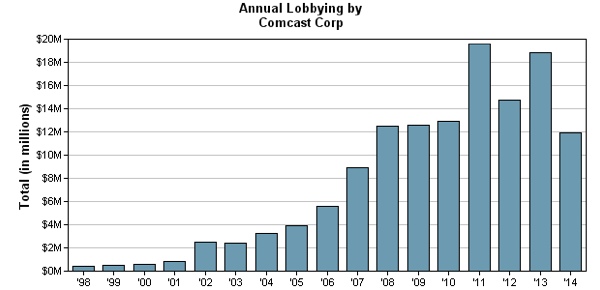Are you frustrated by the low speed and high cost of your cable Internet connection? It’s a common problem. We Americans pay some of the highest prices for broadband Internet service in the world, and yet, our speed lags behind a number of other countries including Latvia, Romania and Denmark. So what’s the holdup? Who – or what – is responsible for the slow state of U.S. Internet?
One thing’s for sure: The problem isn’t technological. The nation’s largest cable conglomerate, Comcast, first demonstrated its ability to deliver gigabit speed over hybrid fiber-coaxial cable all the way back in 2011. And yet today, four years and millions of dollars in taxpayer-paid subsidies later, Comcast is proudly touting its ability to offer half-gigabit service for a beyond insane monthly fee of $399.95 (with 3-year contract required).
Comcast points the finger of blame at us, the customer, suggesting we simply don’t want faster Internet. “The issue with such speed is really more about demand than supply,” Comcast Executive Vice President David L. Cohen wrote in an editorial published in the Philadelphia Inquirer. “As consumer demand grows for faster speeds, a competitive marketplace of wired and wireless broadband providers will be ready to serve it.”
Of course, it’s silly to suggest that us broadband customers don’t want faster speeds. The want and need is there. The average U.S. connection speed is now just 11.5 Mbps, well under the 25Mbps needed to provide content to the emerging 4K TV market. Many Americans don’t even have speeds capable of delivering standard HD video content over Netflix or Hulu, simply because they can’t afford it. Comcast’s prices for high speed Internet starts at $40 per month for just 3 Mbps. Some don’t even have the local infrastructure required for next-generation speeds, held hostage by a local cable monopoly that doesn't want to cut into its profits to invest in it.
No, Mr. Cohen, the problem with U.S. Internet speeds isn’t demand – it really is your company’s heavy-handed attempts to control supply. Your company is still trying to acquire #2 cable provider Time Warner in an attempt to further monopolize the market. Your company is spending millions each and every year on lobbyists to block municipal broadband efforts and make it impossible for communities to create their own alternative. And the only place you seem to be interested in offering high-speed service are in towns like Kansas City, where disruptive competitor Google Fiber is offering 1Gbps service for just $70 a month. Bringing fiber to Kansas City has sparked a huge tech startup scene there, providing a huge boost to the local economy. People have actually moved to the Midwest just for its Internet speeds. The demand is clearly there.

For those of us still wanting, there’s good news: Change indeed seems to be on the horizon. The Comcast-Time Warner merger, once a sure thing, is now in danger of being rejected by regulators. The FCC seems to actually be listening to the public on the topics of net neutrality and Title II, rejecting paid Internet “fast lanes” and Comcast’s (sadly successful) attempt to hold Netflix customers’ service hostage. And gigabit fiber competition is increasing, albeit slowly. We, the public, are winning the battle – we just need to keep fighting.
Want to make your voice heard in supporting faster, more affordable Internet? Take a moment to write to FCC chairman Tom Wheeler (tom.wheeler@fcc.gov), and thank him for supporting both real Net Neutrality (with no "fast lanes") and the reclassification of high-speed Internet as a Title II utility. Then write your representatives in Congress, urging them to do the same. Drop a note to the president, too, if you can. A better Internet is definitely worth the effort.
[Comcast lobbying chart via OpenSecrets.org]














From EmBee on January 21, 2015 :: 3:35 pm
While I wish this article held some truth about the FCC starting to listen to consumers and groups who have good arguments against the TWC/Comcast merger, I’ve got word from some insiders that the deal is pretty much done and that it would take a crazy act of mother nature/god/goddess/civil war/etc. for the deal to not go through.
Reply